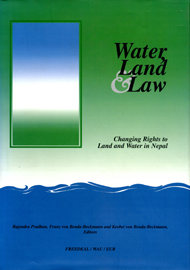Water Land and Law: changing rights to land and water in Nepal

Author
Rajendra Pradhan, Franz von Benda-Beckmann and Keebet von Benda-Beckmann (eds.)
Publisher
Kathmandu: Freedeal
Year of publication
2000
ISBN
99933316008
OPAC
Abstract
Throughout Nepal's history, rights to water have been intimately related to the political structures. Currently, political authorities intervene in irrigation systems to strengthen their political positions. Such interventions always entail change in rights to water, among the existing users and between old users and new users. The historical processes of shifts in power within irrigation systems and within the wider social, economic and political contexts are explored. The contributions focus on the role of law in the plural legal settings typical for small-scale irrigation in Nepal, in which customary law, the law of the state in its various historical manifestations, and religious law are intermingled. More recently, legal notions brought in by large donors have added to the legal complexity. Conflicts and conflict management at different levels (within the household, between users of an irrigation system and between irrigation systems) are described to show how disputes are negotiated and managed in a variety of local and governmental settings. Water rights are also linked to land rights and to labour. Since land rights and labour relations are highly stratified, water rights are also subject to stratification. Class, caste and gender determine whether water users have rights to use water and to participate in relevant decisions about water and how they can maintain and defend their rights.
